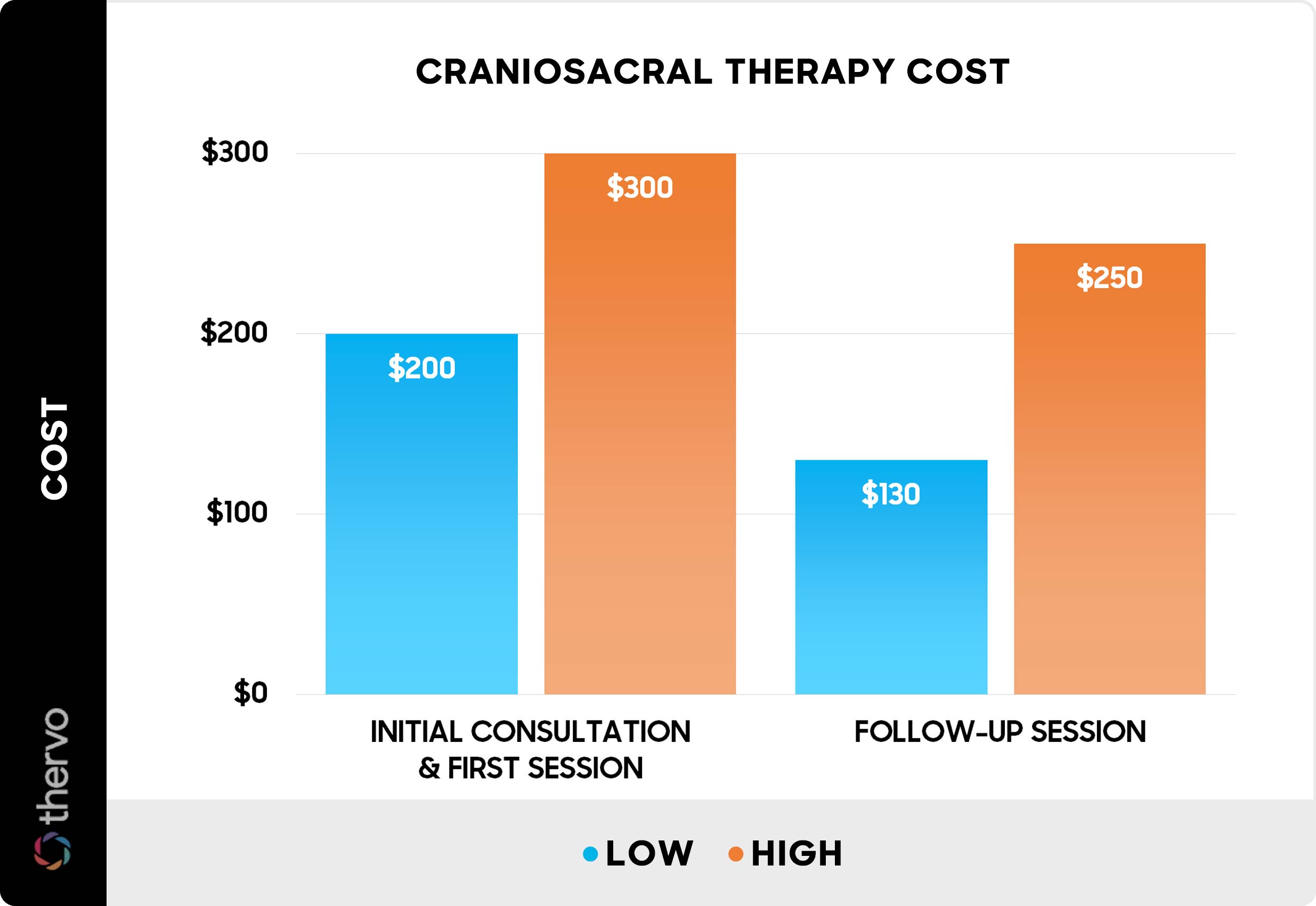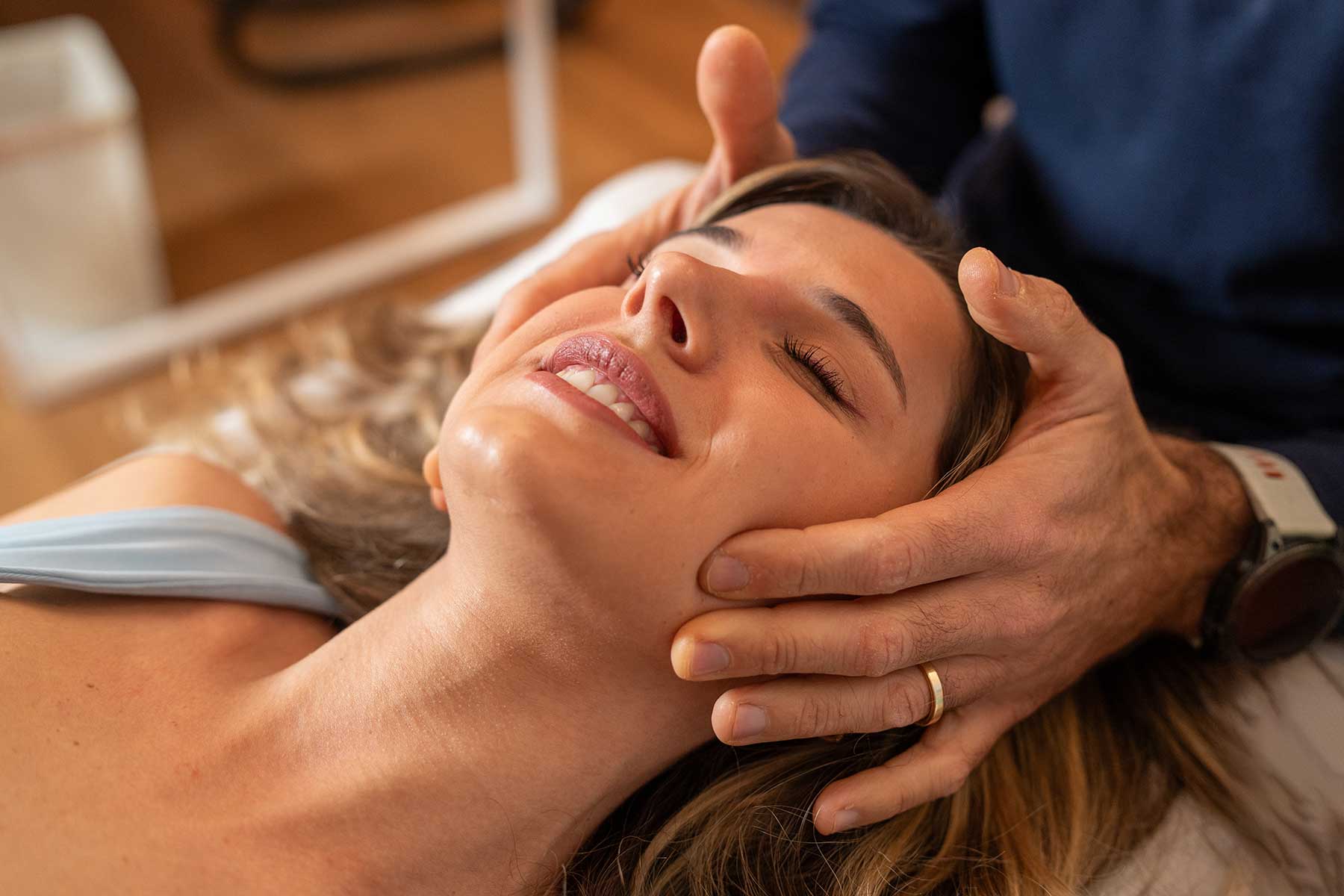
How much does craniosacral therapy cost?
How much does craniosacral therapy cost?
$200 – $300 average cost for consultation & first session
$130 – $250 average cost per follow-up session
Craniosacral therapy cost
Craniosacral therapy costs $130 to $250 per session on average, depending on the session length, client's age, therapist's experience, and your location. An initial consultation and first session costs $200 to $300. Some craniosacral therapists offer a discount if you purchase a package of three or more sessions.

| Session type | Average cost |
|---|---|
| Initial consultation & first session | $200 – $300 |
| Follow-up session | $130 – $250 |
What is craniosacral therapy?
Craniosacral therapy (CST) is a gentle, hands-on treatment that focuses on the soft tissues and fluid surrounding the brain and spinal cord. During treatment, practitioners use a light touch to detect rhythmic movements of cerebrospinal fluid and apply gentle pressure to release restrictions in the craniosacral system.
Craniosacral therapy sessions are performed with the client fully clothed and lying on a treatment table.
How does craniosacral therapy work?
Craniosacral therapy works by addressing restrictions in the craniosacral system through gentle manual techniques. When restrictions occur in this system, they may contribute to various health issues and discomfort.
Practitioners believe cerebrospinal fluid moves in a rhythmic pattern that can be felt through light touch. The therapist uses approximately 5 grams of pressure—about the weight of a nickel—to evaluate and treat the craniosacral system.
What does craniosacral therapy help with?
Craniosacral therapy can be used to address a wide range of conditions affecting the central nervous system and overall well-being. Many people seek treatment for chronic pain conditions, stress-related disorders, and various neurological symptoms.
Common health conditions that may benefit from craniosacral therapy include:
Chronic neck or back pain
Headaches and migraines
Stress, tension, anxiety, and depression
Fibromyalgia and chronic fatigue syndrome
TMJ (temporomandibular joint) disorders
Vertigo and balance issues
Craniosacral therapy cost factors
Several factors can affect the cost of craniosacral therapy:
Session length: Therapists charge more for longer sessions. Standard sessions last 60 minutes, but many practitioners offer 75-minute or 90-minute sessions to treat complex cases.
Infant vs. adult: Pediatric craniosacral therapy sessions are often shorter and may cost slightly less than adult sessions.
Therapist's experience: Highly experienced practitioners with advanced certifications charge more than newly certified craniosacral therapists.
Location: Prices for craniosacral therapy are often higher in urban areas and regions with higher costs of living.
Package discounts: Many practitioners offer reduced rates if you purchase a package of multiple sessions up front.
FAQs about craniosacral therapy
Is craniosacral therapy covered by insurance?
Most health insurance plans do not cover craniosacral therapy as it's considered an alternative or complementary treatment. However, some exceptions exist:
Health Savings Accounts (HSAs) and Flexible Spending Accounts (FSAs) may allow you to use pre-tax dollars for craniosacral therapy.
Some insurance plans cover craniosacral therapy when performed by a licensed physical therapist or chiropractor to treat a condition diagnosed by a medical provider.
Contact your insurance provider directly to determine your coverage options and request pre-authorization if required.
Is craniosacral therapy legitimate?
While some medical professionals question the legitimacy of craniosacral therapy, many patients report positive outcomes. The therapy is considered safe when performed by a trained practitioner, as it uses very gentle pressure and non-invasive techniques.
Research on craniosacral therapy shows mixed results, with some studies indicating benefits for certain conditions while others show limited or no evidence of any benefits.
Does craniosacral therapy work?
Individual responses to craniosacral therapy vary significantly. Many patients report improvements in pain levels, stress reduction, better sleep, and enhanced overall well-being after treatment. The therapy's gentle approach makes it suitable for people who cannot tolerate more aggressive forms of manual therapy.

Where to find craniosacral therapy near you
Follow these tips to help you find an experienced craniosacral therapist near you:
Read reviews of local craniosacral therapists on Thervo and Google.
Contact several therapists to discuss the specific health issues you'd like them to treat.
Ask questions about their experience, training, and treatment process.
Confirm the therapist is licensed or certified.
Ask about prices for an initial consultation, follow-up sessions, and package discounts.
Questions to ask a craniosacral therapist
Ask these important questions to ensure you choose a skilled, reputable craniosacral therapist:
How many years of craniosacral therapy experience do you have?
What craniosacral therapy training and certifications have you completed?
Are you licensed as a massage therapist?
Do you maintain continuing education requirements for craniosacral therapy?
What conditions do you most commonly treat with craniosacral therapy?
What should I expect during my first session?
How many sessions do you recommend for my specific condition?
Do you offer package discounts for multiple sessions?
Can you provide references from other healthcare providers or patients?